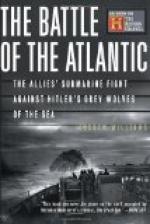It was noon, the sky overcast, the wind blowing strong from the southeast, when the Virginia coast was first sighted from our mast-head. An hour later it became plainly visible from the deck below, and the prisoners were routed out from their quarters, and the shackles, removed from limbs when we first arrived on board, were again riveted in place, binding them together in fours, preparatory to landing. I, with one or two others, already disposed of, and in control of masters, were spared this indignity, and permitted to move about as we pleased within the narrow deck space reserved for our use. The last meal was served in the open, the men squatting on the deck planks, endeavoring to jest among themselves, and assuming a cheerfulness they were very far from feeling. The long hardships of the voyage had left indelible marks on the majority, and they were by now a woe-begone, miserable lot, who had largely abandoned themselves to despair.
The Monmouth campaign had been brief, but no less disastrous to the men engaged in it. Those who survived the one battle, wounded and fugitive, had been hunted down remorselessly like so many wild beasts. Escape from the pursuit of soldiers was almost impossible, and they had been brutally beaten and bruised by infuriated captors; and then, uncared for, nor shown the slightest mercy, had been thrust into loathsome gaols to helplessly await trial, and a certain conviction. No pen could adequately describe the suffering and horror of those months of waiting, while the unfortunate victims lived in crowded, dirty cells, subjected to every conceivable indignity and insult from brutal guards, half starved, and breathing foul, fetid air—the breath of sickness, the stench of unclean wounds.




